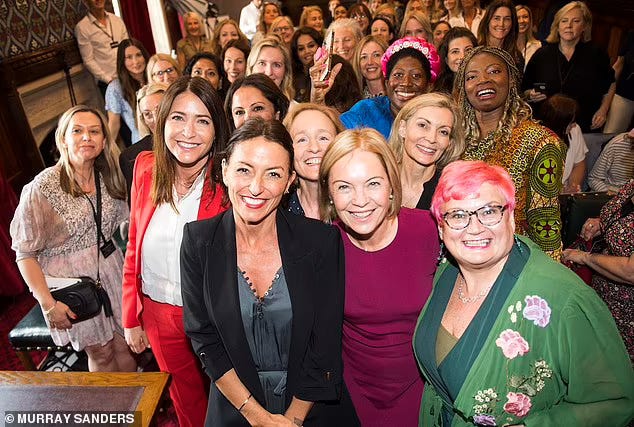Why menopause storytelling needs more men
A night with Mariella Frostrup and Davina McCall showed me why we all need to get angrier about workplace iniquity
Recently, I spent the evening with six of the best campaigners in healthcare and learned one of the secrets of effective business storytelling – involve the people who don’t think that they matter. Because they do.
There was journalist and campaigner Mariella Frostrup, presenter and documentary-maker Davina McCall, Channel 4 boss Alex Mahon, Liv Garfield the CEO of Severn Trent water, Olympic champion Dame Jessica Ennis-Hill and government adviser and gynaecologist Professor Dame Lesley Regan.
We were at an event for Wellbeing For Women, a charity dedicated to raising issues from better workplace menopause strategies to fighting societal iniquities in gynaecological care. From investing more in the research and development of women-specific medicines, to getting more women involved in science.
What these six successful campaigners demonstrated was that if business is to be at the forefront of healthcare storytelling – and it should be – you need three key elements.
First, a platform in which emotionally-engaging, taboo-busting stories - raw with honesty - are shared with an audience that’s unafraid to learn. In this case, men like me.
Second, that company leaders need to demonstrate the value of wellness in successful business decision-making. Alex and Liv were brilliant at this, explaining how their companies have adopted pioneering strategies to improve women’s wellbeing in the workplace.
Third, and perhaps most important of all, to effect change you need a healthy dose of anger, outrage and urgency. Davina and Mariella in particular are inspiring examples of how a deep-seated sense of injustice needs the oxygen of publicity if it’s to transform business and people’s lives.
For instance, I’ve never understood why something that affects 50% of the workforce – sometimes with adverse effects that can destroy careers – isn’t openly discussed by the other 50%. According to a recent report, 10 per cent of women aged 45-55 have left work because of symptoms of the menopause, while 14 per cent in this age group had reduced their hours, and 8 per cent had not applied for a promotion because of symptoms.
We’re pretty swift at calling out bullying in the workplace, the legal profession is adept at aggressively penalising a lack of diversity amongst employees, and tribunals are filled with people who feel they’ve been treated unfairly. We see these stories all of the time.
But where is the menopause storytelling? Why, as Mariella said at that event, do we have one-off documentaries about women’s health issues, as if our appetite ought to be sated by 60 minutes? She and Davina have been inspirational at bringing these issues to a wider public but change is still slow and piecemeal.
I wonder if one of the answers is that storytelling needs to appeal to and involve the very people who think that those stories have nothing to do with them. In this case men, who wrongly think that they shouldn’t be a part of these conversations. Despite the fact that they have mothers, sisters, wives, partners, daughters, colleagues and female friends.
Perhaps men need to get angry too and not be embarrassed to show it.
LISTEN TO THIS
Tony Fadell is one of Silicon Valley’s most high-profile designers, investors and entrepreneurs. He also wrote a book which is essential reading for anyone who wants to understand how design makes our lives better - Build: An Unorthodox Guide to Making Things Worth Making. But it’s this interview that I really like because he discusses how he uses storytelling in business – particularly in how he designs, build and sells products. This is a great podcast
READ THIS
I’ve appeared in two books. One, a work of fiction by the late and much-missed Reg Gadney. I forgave him for killing me off pretty early in Immaculate Deception. The second one I’m really proud of. Former Guardian editor Alan Rusbridger has written a powerful book about the value of journalistic storytelling and how it can benefit from society. His chapter about local news and the Grenfell disaster discusses some of the issues I’ve raised in the past. My first job was as a local journalist in the area in the 1990s and I firmly believe a good local press has the power to uncover corruption and incompetence before lives are lost.
WATCH THIS
I’m unsure whether journalist Graham Hancock is a genius or deluded. It doesn’t really matter because his ability to tell a convincing story is at the heart of a gripping documentary series on Netflix, Ancient Apocalypse. Disagree all you like with his theory that a super-intelligent ancient tribe – a so-called lost civilization - was responsible for building some of the most remarkable structures on Earth before suddenly vanishing. But admire his storytelling abilities that make incredibly complex issues feel fresh and approachable. Business people can learn a lot from the simple and captivating way he structures his stories.




